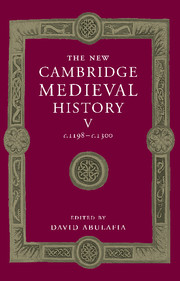Book contents
- Frontmatter
- Introduction
- Part I Common Themes
- Part II The Church in the Thirteenth Century
- Part III The Western Kingdoms
- Part IV Italy
- 15 Northern Italy
- (a) Northern Italy: The maritime republics
- (b) Sardinia and Corsica from the mid-twelfth to the early fourteenth century
- (c) The rise of the signori
- (d) Florence
- 16 The kingdom of Sicily under the Hohenstaufen and Angevins
- Part V The Mediterranean Frontiers
- Part VI The Northern and Eastern Frontiers
- Appendix Genealogical tables
- Primary sources and secondary works arranged by chapter
- Index
- Plate section
- Map 1 Europe in the thirteenth century
- Map 3 France, c. 1260
- Map 5 Germany and the western empire
- Map 6 Genoa, Venice and the Mediterranean
- Map 8 The Latin empire of Constantinople and its neighbours
- Map 10 Aragon and Anjouin the Mediterranean">
- References
(a) - Northern Italy: The maritime republics
from 15 - Northern Italy
Published online by Cambridge University Press: 28 March 2008
- Frontmatter
- Introduction
- Part I Common Themes
- Part II The Church in the Thirteenth Century
- Part III The Western Kingdoms
- Part IV Italy
- 15 Northern Italy
- (a) Northern Italy: The maritime republics
- (b) Sardinia and Corsica from the mid-twelfth to the early fourteenth century
- (c) The rise of the signori
- (d) Florence
- 16 The kingdom of Sicily under the Hohenstaufen and Angevins
- Part V The Mediterranean Frontiers
- Part VI The Northern and Eastern Frontiers
- Appendix Genealogical tables
- Primary sources and secondary works arranged by chapter
- Index
- Plate section
- Map 1 Europe in the thirteenth century
- Map 3 France, c. 1260
- Map 5 Germany and the western empire
- Map 6 Genoa, Venice and the Mediterranean
- Map 8 The Latin empire of Constantinople and its neighbours
- Map 10 Aragon and Anjouin the Mediterranean">
- References
Summary
AT the turn of the twelfth and thirteenth centuries, the economies of the three major Italian maritime republics were flourishing. Their maritime commerce brought in wealth which enriched those engaged in trade, filtered through to the rest of the populace and funded the physical embellishment of their cities. Genoa and Venice also had transalpine trade by land with France and southern Germany which made significant contributions to their prosperity. This foreign trade was secured by the republics by means of political and economic treaties and agreements with their trading partners. After the massacre of the Latins in Constantinople in 1182, Pisa and Genoa negotiated renewal of their privileges and re-establishment of their quarters in 1192. In 1198, Venice finally reached agreement with the Byzantines on her claims for compensation for losses incurred in 1171 and for re-establishment of her quarter. In the Holy Land, in return for their participation in the Third Crusade, the republics received confirmation of their earlier privileges in the crusader states and grants of new ones: the most important being those of Conrad of Montferrat to the Venetians in 1192, in Tyre; and of Guy of Lusignan to the Pisans in 1189 and the Genoese in 1190, in Acre. In Egypt the aftermath of the Third Crusade did not lend itself to renegotiation of the earlier commercial treaties of the republics with the Ayyubid sultans. But while formal treaties were not renegotiated until 1205 (with Venice), the ships of the republics nevertheless crowded Alexandria in the decades of relative peace between 1191 and 1217.
- Type
- Chapter
- Information
- The New Cambridge Medieval History , pp. 417 - 446Publisher: Cambridge University PressPrint publication year: 1999
References
- 1
- Cited by

